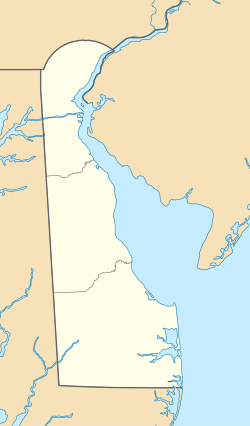Rhodes Pharmacy | |
 Rhodes Pharmacy, April 2010 | |
| Location | 36 E. Main St., Newark, Delaware |
|---|---|
| Coordinates | 39°41′00″N75°45′07″W / 39.683302°N 75.752056°W |
| Area | 0.1 acres (0.040 ha) |
| Built | 1917 |
| Architect | Whittingham, Richard A. |
| Architectural style | Early Commercial, Gothic Revival |
| MPS | Newark MRA |
| NRHP reference No. | 83001404 [1] |
| Added to NRHP | February 24, 1983 |
Rhodes Pharmacy is a historic pharmacy building located at Newark in New Castle County, Delaware. It was built in 1917 and is a two-story, rectangular brick commercial building with a concrete Gothic Revival facade. [2]
It was added to the National Register of Historic Places in 1983. [1]



